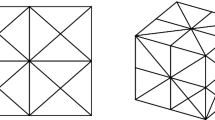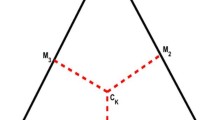Abstract
This work deals with the approximation of distributed null controls for the Stokes system. The goal is to compute an approximation of controls that drives the solution from a prescribed initial state at \(t=0\) to zero at \(t=T\). The existence of square-integrable controls has been obtained in Fursikov and Imanuvilov (Controllability of evolution equations, pp 1–163, 1996) via Carleman type estimates. We introduce and analyze a least-squares formulation of the controllability problem, and we show that it allows the construction of convergent sequences of functions toward null controls for the Stokes system. The approach consists first in introducing a class of functions satisfying a priori the boundary conditions in space and time—in particular the null controllability condition at time \(T\)—and then finding among this class one element satisfying the Stokes system. This second step is done by minimizing a quadratic functional, among the admissible corrector functions of the Stokes system. Numerical experiments for the two-dimensional case are performed in the framework of finite element approximations and demonstrate the interest of the approach. The method described here does not make use of duality arguments and, therefore, avoids the introduction of numerical ill-posed problem, as is typical when parabolic-type equation is considered. This work extends (Munch and Pedregal in Eur J Appl Math, 2014) where the case of the heat equation is discussed.










Similar content being viewed by others
References
Bochev B, Gunzburger M (2009) Least-squares finite element methods, Applied Mathematical Sciences, 166. Springer, New York, xxii+660
Ben Belgacem F, Kaber SM (2011) On the Dirichlet boundary controllability of the one-dimensional heat equation: semi-analytical calculations and ill-posedness degree. Inverse Probl 27(5):055012. doi:10.1088/0266-5611/27/5/055012
Coron JM (2007) Control and nonlinearity. In: Mathematical surveys and monographs, vol 136. American Mathematical Society, Providence, RI, pp xiv+426. ISBN: 978-0-8218-3668-2; 0-8218-3668-4
Coron J-M, Guerrero S (2009) Null controllability of the N-dimensional Stokes system with N-1 scalar controls. J Diff Eq 246(7):2908–2921
Fabre C (1995/96) Uniqueness results for Stokes equations and their consequences in linear and nonlinear control problems. ESAIM COCV 1:267–302
Fernández-Cara E, Guerrero S, Imanuvilov OY, Puel JP (2004) Local exact controllability of the Navier-Stokes system. J. Math. Pures Appl 83(12):1501–1542
Fernández-Cara E, Münch A (2011) Numerical null controllability of a semi-linear heat equation via a least squares method. C R Math Acad Sci Paris 349(15–16):867–871. doi:10.1016/j.crma.2011.07.014
Fernández-Cara E, Münch A (2012) Numerical null controllability of semi-linear 1D heat equations: fixed points, least squares and Newton methods. Math Control Relat Fields 2(3):217–246
Fernández-Cara E, Münch A (2013) Strong convergence approximations of null controls for the heat equation. Séma J 61(1):49–78
Fernández-Cara E, Horsin T, Kasumba H (2013) Some inverse and control problem for fluids. Ann Math Blaise Pascal 20(1):101–138
Fursikov AV, Imanuvilov OY (1993) On approximate controllability of the Stokes system. Ann Fac Sci Toulouse II(2):205–232
Fursikov A-V, Imanuvilov OY (1996) Controllability of Evolution Equations, vol 34., Lecture Notes Series, numberSeoul National University, Korea, pp 1–163
R. Glowinski, Numerical Methods for Nonlinear Variational Problems Springer series in computational physics 1983.
R. Glowinski, Numerical Methods for Fluids, Handbook of Numerical Analysis, P.G. Ciarlet, J.L.Lions editors, Part 3, North Holland, 2003.
Glowinski R, Lions J-L, He J (2008) Exact and approximate controllability for distributed parameter systems: a numerical approach Encyclopedia of Mathematics and its Applications, 117. Cambridge University Press, Cambridge
Gunzburger M (2003) Perspectives in flow control and optimization, Advances in Design and Control, 5. Society for Industrial and Applied Mathematics (SIAM), Philadelphia
Hecht F, Le Hyaric A, Morice J, Ohtsuka K, Pironneau O. Free-Fem++: Third Edition, Version 3.12, http://www.freefem.org/++
Imanuvilov OYu (2001) Remarks on exact controllability for the Navier–Stokes equations. ESAIM Control Optim Cal Var 6:39–72
Imanuvilov OYu, Puel J-P, Yamamoto M (2009) Carleman estimates for parabolic equations with nonhomogeneous boundary conditions. Chin Ann Math 30B(4):333–378
Lasiecka I, Triggiani R (2000) Control theory for partial differential equations: continuous and approximation theories. I. Abstract parabolic systems. Encyclopedia of Mathematics and its Applications, 74. Cambridge University Press, Cambridge
Lions J-L (1988) Contrôlabilité exacte, perturbations et stabilisation de systèmes distribués, Recherches en Mathématiques Appliquées, Tomes 1 et 2. Masson, Paris
Micu S, Zuazua E (2011) On the regularity of null-controls of the linear 1-d heat equation. C R Acad Sci Paris Ser I 349:673–677
Münch A (2013) A variational approach to approximate controls for systems with essential spectrum: application to membranal arch. Evol Equ Control Theory 2(1):119–151
Münch A, Zuazua E (2010) Numerical approximation of null controls for the heat equation: ill-posedness and remedies. Inverse Probl 26 (8):085018
Münch A, Pedregal P (2014) Numerical null controllability of the heat equation through a least squares and variational approach. Eur J Appl Math. doi:10.1017/S0956792514000023
Münch A, Pedregal P (2013) A least-squares formulation for the approximation of null controls for the Stokes system. C R Acad Sci Série 1 351:545–550
Pedregal P (2010) A variational perspective on controllability. Inverse Probl 26(1):015004
Pedregal P (2012) A variational approach for the Navier–Stokes system. J Math Fluid Mech 14(1):159–176
Temam R (2001) Navier–Stokes equations. Theory and numerical analysis. Reprint of the 1984 edition. AMS Chelsea Publishing, Providence, RI
Russell DL (1978) Controllability and stabilizability theory for linear partial differential equations. Recent progress and open questions. SIAM Rev 20:639–739
Author information
Authors and Affiliations
Corresponding author
Rights and permissions
About this article
Cite this article
Münch, A. A least-squares formulation for the approximation of controls for the Stokes system. Math. Control Signals Syst. 27, 49–75 (2015). https://doi.org/10.1007/s00498-014-0134-x
Received:
Accepted:
Published:
Issue Date:
DOI: https://doi.org/10.1007/s00498-014-0134-x




